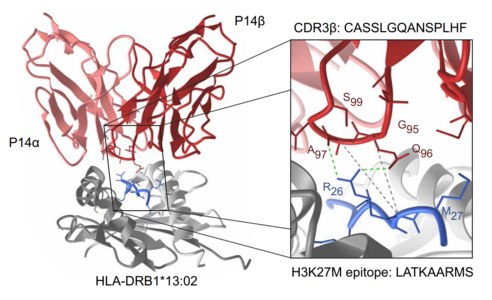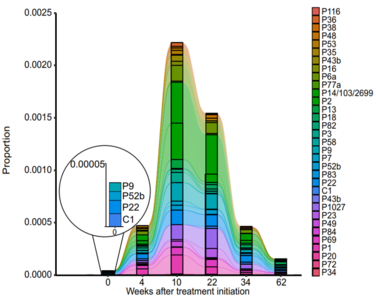Sie befinden sich hier
Inhalt
Date: 09.02.2024
BioMed X and the University Medical Centre Mannheim announced the publication of two manuscripts in the journal Science Advances in the field of cancer immunology. The work is based on a collaboration between the two institutions and researchers from the German Cancer Research Centre (DKFZ), the University of Heidelberg and the Helmholtz Institute for Translational Oncology (HI-TRON). The main aim of the collaboration was to understand the role of specific T-cell responses in a patient with an aggressive subtype of diffuse glioma who achieved durable remission after treatment with a neoepitope peptide vaccine at the University Hospital of Mannheim.
T-cells are essential for maintaining human health, as one of their functions is to kill tumor cells. This process is driven by the specific interaction between receptors on the surface of T cells (T cell receptors or TCRs) and mutated peptides (antigens) on the surface of tumor cells. The identification of such cancer-specific antigens and the TCRs that bind them form the basis of current efforts to develop targeted cancer therapies. However, functionally robust high-throughput methods have been lacking.
Dr. John M. Lindner and his research team at the BioMed X Institute in Heidelberg have developed the T-FINDER platform to address this problem. The platform, now published in Science Advances, is able to rapidly screen thousands of potential interactions between TCRs and antigens on the surface of potential target cells for their ability to activate T cells. The team, led by Miray Cetin, Dr. Veronica Pinamonti and Dr. Theresa Schmid, first developed a highly sensitive reporter cell line for T cell activation. This cell line is the core of the T-FINDER, as it allows the ligands of any number of T-cell activating receptors (in addition to the classical TCRs, e.g. CAR-T receptors) to be determined with high accuracy. For TCRs, Dr. Pinamonti's doctoral thesis focused on the recognition of HLA class II peptides. This led to the development of new strategies to improve antigen processing and presentation in target cells. This class of ligands has been very difficult to access experimentally and, together with its superior sensitivity, is a key unique selling point of the T-FINDER platform.
In a second manuscript published at the same time, the team collaborated with a research group led by Dr. Ed Green from the Clinical Cooperation Unit Neuroimmunology and Brain Tumor Immunology (Head: Prof. Michael Platten) at the DKFZ and the University Hospital Mannheim. The researchers used T-FINDER to decipher the immune response of two patients with diffuse midline glioma who had been vaccinated against the cancer-causing H3 mutation. The patients who received the H3 vaccine showed promising but very different responses. Using T-FINDER, the two research groups were able to pinpoint the link between the functional immune response of a patient in remission and their TCRs that recognize HLA class II-presenting epitopes of mutant H3. This work provides important insights into the mechanism of anti-tumour T cell responses in these patients and will support ongoing vaccination trials.
"We are very pleased to publish the results of our collaboration with Ed Green, Michael Platten and colleagues," said John Lindner, Head of Immunology Discovery at the BioMed X Institute. "Our collaborative research has demonstrated the unique sensitivity, flexibility and power of our new T-FINDER platform, particularly for HLA class II presenting targets, which have been a major challenge in the past."
"Previously, we were very limited in our ability to analyze Class II epitopes, such as the H3 mutant. The T-FINDER platform has enabled us to identify and analyse dozens of H3-reactive TCRs. This allows us to follow patients' immune responses to tumour vaccines today and to identify specific TCRs for tomorrow's autologous cell therapies," says Ed Green, head of the Immunogenomics Team in Michael Platten's laboratory at the DKFZ.
Joint press release by BioMed X and of the University Medical Centre Mannheim (German Language):
06.02.2024 Neue T-Finder-Plattform liefert tiefe Einblicke in T-Zell-Antwort auf neuartigen Krebsimpfsoff
Original scientific publications:
T-FINDER: A highly sensitive, pan-HLA platform for functional T cell receptor and ligand discovery.
Cetin M, Pinamonti V, Schmid T, Boschert T, Mellado Fuentes A, Kromer K, Lerner T, Zhang J, Herzig Y, Ehlert C, Hernandez-Hernandez M, Samaras G, Torres CM, Fisch L, Dragan V, Kouwenhoven A, Van Schoubroeck B, Wils H, Van Hove C, Platten M, Green EW, Stevenaert F, Felix NJ, Lindner JM.
Science Advances. 2024.10(5):eadk3060.
DOI: 10.1126/sciadv.adk3060
H3K27M neoepitope vaccination in diffuse midline glioma induces B and T cell responses across diverse HLA loci of a recovered patient.
Boschert T, Kromer K, Lerner T, Lindner K, Haltenhof G, Tan CL, Jähne K, Poschke I, Bunse L, Eisele P, Grassl N, Mildenberger I, Sahm K, Platten M, Lindner JM, Green EW.
Science Advances. 2024.;10(5):eadi9091.
DOI: 10.1126/sciadv.adi9091


